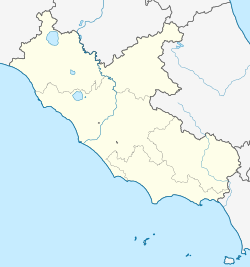Ventotene
Comune di {{{name}}} | |
|---|---|
| Coordinates: 40°48′N 13°26′E / 40.800°N 13.433°E | |
| Country | Italy |
| Region | Lazio |
| Province | Latina (LT) |
| Government | |
| • Mayor | Giuseppe Assenso (since April 4, 2005) |
| Demonym | Ventotenesi |
| Time zone | UTC+1 (CET) |
| • Summer (DST) | UTC+2 (CEST) |
| Postal code | 04020 |
| Dialing code | 0771 |
| Patron saint | St. Candida |
| Saint day | September 19 |
| Website | www.comune.ventotene.lt.it |
Ventotene is an island in the Tyrrhenian Sea, off the coast of Campania, Italy. It is the remains of an ancient volcano, and is part of the Pontine Islands. In Roman times it was known as Pandataria and Pandateria. It is also a commune belonging to the province of Latina (Lazio).

The island is elongated, with a length of 3 kilometres and a maximum width of about 800 metres. Santo Stefano is located 2 kilometres to the east, and Ponza is 40 kilometres to the west.
The commune with the same name has 633 permanent residents. It includes the island of St. Stefano, which is the site of a massive prison, now closed.
History
Best known as the island to which the emperor Augustus banished his daughter Julia the Elder in 2 BC, as reaction to her excessive adultery, where she was to spend five years, and to which Tiberius banished his grand-niece Agrippina the elder in 29 AD, before perishing, probably of malnutrition, on October 18, 33 AD. After Agrippina's son Gaius (better known as Caligula) became Emperor in 37 AD he went to Pandataria to collect her remains and brought them back to Rome. Agrippina's youngest daughter, Julia Livilla was also exiled to Pandateria. She was deported on this island on the orders of her uncle, the emperor Claudius, at the instigation of his wife, Messalina, in 41 AD. Sometimes later, she was discreetly starved to death there and her remains were probably brought back to Rome when her sister Agrippina the Younger became influential as the emperor's wife. Another distinguished lady of the Julio-Claudian dynasty, Claudia Octavia, who was the first wife of the emperor Nero, was banished to Pandateria in 62 AD and executed on the orders of her husband.

This is also the island to which St. Flavia Domitilla, for whom the eponymous catacombs in Rome are named and who hid many saints (or recovered their remains when they were martyred), was banished. She was granddaughter of Emperor Vespasian. She may have died here.
A prison camp was created under Mussolini on the island with up to 700 opponents, including 400 communists, between 1939 and 1943. One of them was Altiero Spinelli who wrote there a text now known as the "Ventotene Manifesto", promoting the idea of a federal Europe after the war.

During World War II, the island also served as home to a 114 man German garrison that defended a key radar station. On the night of September 8, 1943, an American PT Boat silently slipped into Ventotene's harbor and offloaded 46 American Paratroopers from the 509th Parachute Infantry Battalion. The paratroopers quickly met with a local exile from the Italian mainland who then lied to the German commander that there was a regiment of paratroopers on the island, deposited by a fleet of allied ships. Terrified, the German commander demolished his own positions and weapons, and then surrendered to the weaker American force before realizing his mistake. Ventotene was liberated without a shot being fired at 3 AM September 9, 1943.
Main sights
This section needs expansion. You can help by adding to it. |
External links



